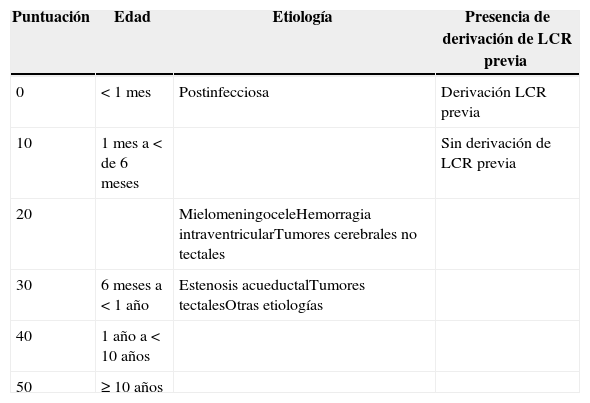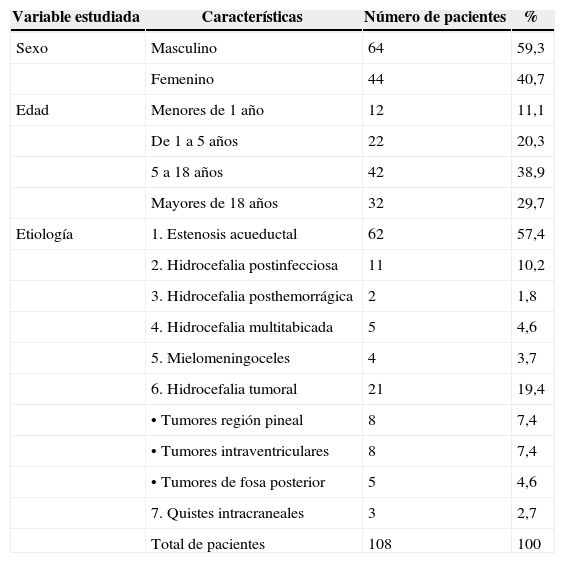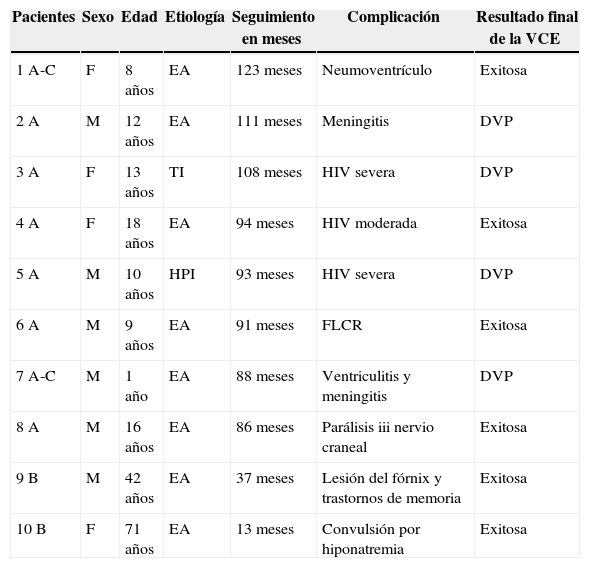Se han publicado algunos casos clínicos advirtiendo de la existencia de complicaciones severas y a veces fatales de los abordajes neuroendoscópicos intracraneales. El objetivo de esta investigación fue analizar la incidencia de complicaciones en nuestro medio en la realización de la ventriculocisternostomía endoscópica (VCE) del tercer ventrículo en 108 pacientes hidrocefálicos.
MétodosSe realizó un estudio retrospectivo y descriptivo de 108 pacientes (76 pediátricos y 32 adultos) operados por VCE por presentar una hidrocefalia obstructiva, de diferentes etiologías, desde enero de 2004 hasta marzo de 2014.
ResultadosSe realizaron 114 VCE en 108 pacientes. El periodo de seguimiento fue desde 6meses hasta 10años, con una media de 6,8años. La edad osciló entre 6días de edad y 75años, con una media de 18años. La etiología más frecuente de la hidrocefalia fue la estenosis acueductal, con 62 pacientes (57,4%). Complicaciones severas existieron en 10 (9,2%) de los 108 pacientes tratados. Se aplicó en la serie la puntuación de éxito de la VCE (PEVCE) por Kulkarni, siendo esta predictiva de los resultados.
ConclusionesEn todas las técnicas quirúrgicas de mínimo acceso existe una curva de aprendizaje de la cual no está exenta la VCE. Seleccionar adecuadamente los pacientes, así como operar un número adecuado de pacientes por año, es muy importante para evitar las complicaciones. La PEVCE tiene un valor predictivo importante en establecer de una manera sencilla las posibilidades de éxito de la VCE.
Several reports have been published in relation to complications, sometimes fatal, associated to endoscopic ventriculocisternostomy (EVC). The objective of this study was to determine the range of complications using this surgical technique in a series of 108 patients.
MethodsA retrospective and descriptive study was performed on 108 hydrocephalic patients: 76 children and 32 adults. All of them presented various forms of obstructive hydrocephalus.
ResultsIn a total of 108 patients, 114 EVC were performed. The follow-up period ranged between 6months and 10years (mean 6.8years). Age of patients ranged from 6days to 75years old (mean 18years). Aqueductal stenosis was the most common aetiology, with 62 patients (57.4%). Significant complications occurred in 10 patients (9.2%). During the course of the study, the complication rate dropped significantly. No patient died because of the procedure (mortality 0%). We applied the Endoscopic Third Ventriculostomy Success Score (ETVSS) developed by Kulkarni and collaborators to our series to know if this score could be useful in predicting ETV results.
ConclusionLike all minimally-invasive techniques, there is a steep learning curve for EVC. Correct patient selection and surgeon experience (which means not only familiarity with endoscopic techniques but also the performance of a minimum number of surgeries per year) are very important to avoid complications. The ETV Success Score devised closely approximates the predicted probability of ETV success.
Article

If it is the first time you have accessed you can obtain your credentials by contacting Elsevier Spain in suscripciones@elsevier.com or by calling our Customer Service at902 88 87 40 if you are calling from Spain or at +34 932 418 800 (from 9 to 18h., GMT + 1) if you are calling outside of Spain.
If you already have your login data, please click here .
If you have forgotten your password you can you can recover it by clicking here and selecting the option ¿I have forgotten my password¿.














